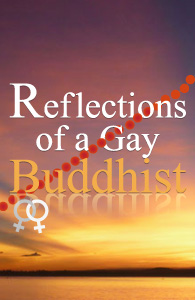Just the other day I got bollocked at work for something that wasn’t my fault. Before I met the Dharma, I would have fought tooth and nail for "justice" and "fairness." However, now with the Dharma, it’s rather different.

What happened was – I was working on editing a book by my colleague and friend, the very lovely David. The process agreed upon was that chapters were first edited by my Editor-in-Chief (EIC), then passed to me to edit, then it went back to dear David, who would collate the changes, print out and put them back on the EIC’s desk.
Simple really.
However, when the EIC came into the office, expecting to see a nice stack of printed papers on her desk, they weren’t there. Of course my dearest David was not in the office at the time, but I was, so I was told off by my CEO for not putting the chapters on EIC’s desk - when it wasn’t even my job to do so. I pursed my lips and glowered inside, while I tried (and failed dismally) to maintain a façade of beatific Buddhahood.
I bit back on explanations of my "innocence," on elaborate justifications and on sarcasm, which would get me nowhere. So I just told myself to shut up. And chanted some mantras in my head. Chanting mantras really work to calm down anger – really. A simple yet powerful mantra like Om Mani Padme Hum, the mantra of the Buddha of Compassion, does wonders for an errant mind! Mantras are the energy of the respective Buddha in the form of sound, and when chanted, invokes on that energy to bless us and our surroundings. I find I simply can’t be angry when chanting Om Mani Padme Hum!
While I chanted, my mind started to calm down so I was able to think. What could I have done to have avoided the situation or made the situation better? Yes, it wasn’t my job to print out the chapters, but I could have checked if darling David had done so or not, and nag him to death to do so. That would be taking responsibility. By looking beyond our own responsibilities and simply through caring for each other, we can achieve a whole lot more.
Also, I knew that my CEO wasn’t being a bitch (I like her a lot actually) but she was merely trying to get the job done. It wasn’t personal (and so what if it was, anyway).
Of course it’s not easy. It’s not our second nature to be all forgiveness and light. However, we can catch ourselves when we react emotionally to what we perceive as unfair accusations. When we react, it is usually our ego, inflating as quickly as an airbag in an accident and obscuring our vision.
Anger is one of the three deadly poisons, the others being ignorance and attachment. Anger is so deadly because it clouds our judgment and makes us say or do things to hurt someone else, whether they deserve it or not. And some people, I’m sure you know, are skilled at cutting with words. We may regret at the next moment, but the harm is already done and often difficult to repair.
Anger arises when things do not go the way we want. When we are threatened. When we are affronted. When we perceive that we have been wronged.

If Not Now, When? by Kechara Publications features imagery and quotations from H.E. Tsem Tulku Rinpoche's teachings.
One of the Eight Verses of Thought Transformation, which is central to mind training in Tibetan Buddhism, states:
During all actions, as soon as thoughts
Or delusions arise in my mind
That are harmful to myself and others,
May I stop them with effective means!
Buddhism teaches us to realise things as they are. When anger arises, which may harm ourselves and others, we should catch the negative emotions immediately and watch it pass.
As H.E. Tsem Tulku Rinpoche says, “Do not hold anger, it benefits no one. Do not act out of anger, you will only be ashamed afterwards. Do not incite anger because you will get burned. Be the first to make peace. Be the peacemaker and wherever you go, you will be loved and be able to love.”
After being aware of the illusion of anger, and its solution; of focusing outwards and on practical solutions rather than simply meditating on my fragile ego, I found that my negative emotions often quickly evaporate and disappear into the nothingness from which it arose. As I practice more and more on clearing my negativities, it does get easier every time. That’s why they call it spiritual practice!











 打印版本
打印版本










读者回应
I'd like to see a broader Buddhist perspective generally than that arising from one Tibetan teacher, but I understand that this is written from the personal experience of the writer.
I agree that we should be caring for others and yes, you could have looked to see if David had done it. However, this does not make it your responsibility or your fault that it didn't happen.
I am career driven and also caring of others, but to get far you need to state your case. You didnt need to be angry but could have said something like "I wasnt supposed to have done that, but I could have checked". That way there is still a positive spin on the sitution thats also constructive
I agree with the last paragraph of what post 2 says, but not with his earlier criticism of the writer's assumption of responsibility for her colleague’s failure, though it was not technically “her job”. On a practical level, these people were part of a team, and teams tend to work better and more productively if they (including the CEO) assume a mutual full responsibility for achieving their goal, (as opposed to stabbing each other in the back to get ahead, as can happen in some workplaces).
In a wider context, I’ve read, and I think this is the Buddhist approach that the article is getting at (though not unique to Buddhism), that people, through seeing their interconnectedness, can choose to assume responsibility for everything that happens in both their own lives, and the world generally. It may not be literally true; for example, that you are personally responsible for the suffering going on as a result of some dreadful catastrophe, but as an approach it’s quite empowering, leading people to volunteer to go and help in such situations.
On a personal level, someone may be a genuine victim of injustice, but seeing their role in the situation and assuming responsibility isn’t a weakness, it’s a strength that can move them forward.
“If people react negatively to you, and you react in the same way, then you are just the same as them. But, you say, they started it. Yes, they did but you continued it. What is the difference? "
Does it remind us of any part of the present world? If only they could see the light...
Brit-ish - I think it's always a fine balance in the workplace (and even in relationships) - how far do you 'give the victory to others' (as stated in the Eight Verses of Thought Transformation). The answer is not to be a pushover but to see the situation as it is - especially in a secular job, where it's pretty much a dog eat dog mentality - and to control our own reactions. So we react to the real situation rather than a perceived one, which usually manifests when we are hurt and everything seems magnified as a personal attack when it possibly wasn't.
As I am fortunate enough to be working in a Dharma organisation, it's totally a win win situation because the career is not the ultimate goal but spiritual growth is. I did very much want to say 'it wasn't MY job but i could have checked' but that would have arisen out of ego, when as Steveuk says, we are all interconnected so it's a mutual responsibility. Fortunately, the Dharma working environment is a very nurturing one where Dharma workers can really practice Dharma.
Buddhism is all about taking responsibility. When we truly take responsibility over what is happening to us on a daily basis, we realise karma. When we realise karma, our actions will immediately change - because we know the results which will come from the cause.
I love Buddhism!!
Drelin - yes indeed ;)
Thank you everyone again for all your comments... please do keep reading and responding.
Metta,
Sharon
Om= achieve perfection in the practice of generosity
Ma= helps perfect the practice of pure ethics
Ni= helps achieve perfection in the practice of tolerance and patience
Pad= achieve perfection of perseverance
Ma= achieve perfection in the practice of concentration
Hum= helps achieve perfection in the practice of wisdom"
"Om mani padme hum" is the mantra of Avalokitesvara/Kuanyin/Chenrezig (in Tibetan)
"When others out of jealousy,
Mistreat me with abuse, slander and so on,
I will practise accepting defeat
And offering the victory to them.
When someone I have benefited and in whom
I have placed great trust hurts me very badly,
I will practise seeing that person
As my supreme teacher. "
请先登入再使用此功能。